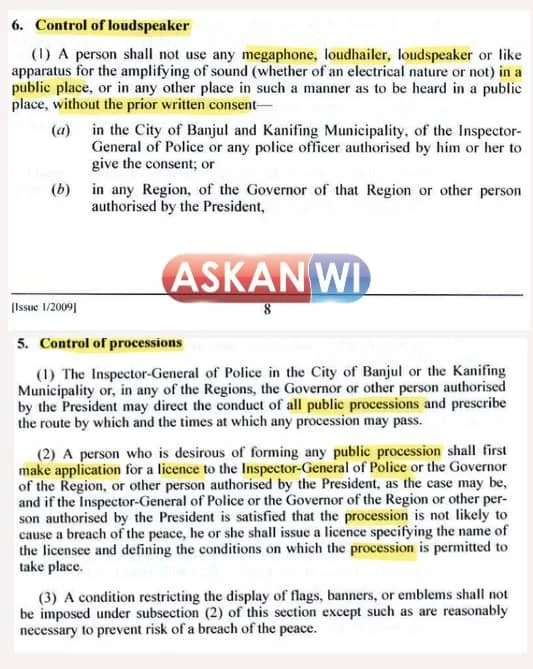19 Detained and Charged for “Unlawful Assembly,” But What Does the Public Order Act Say?
Protestors outside PURA © Askanwi
By Edward Francis Dalliah
On Friday, 22nd August 2025, 19 individuals, including Yusef Taylor, spokesperson for Team Gom Sa Bopa, and prominent activist Ali “Killa Ace” Cham, were arrested for “Unlawful Assembly” under the Gambia’s Public Order Act. This legislation is a colonial-era law enacted in 1961 and amended in 1963 and 2009 and continues to regulate public gatherings more than six decades later.
What Sparked the Protest?
The arrest followed a peaceful demonstration sparked by a recent directive issued by the Gambia Public Utilities Regulatory Authority (PURA). The directive imposed a price floor of D50 per 1GB of data on all GSM companies, a move that triggered a 243% increase in mobile data costs. This effectively eliminated affordable data promotions, placing a heavy burden on ordinary Gambians and drawing public condemnation.
In response to this development, the Gambia Competition & Consumer Protection Commission (GCCPC) issued a statement on 20th August 2025, urging PURA to “rescind” the directive and instead adopt policies that balance affordability with service quality.
The Commission argued that “the introduction of [the] price regulation will prevent consumers from benefiting from unfettered competition. Such regulatory interventions risk undermining the gains of open market rivalry, where businesses compete on price, quality, and service innovation to the benefit of consumers.”
In solidarity with the GCCPC’s and the public, Team Gom Sa Bopa, Gambians Against Looted Assets (GALA), and the Edward Francis Small Center for Rights and Justice (EFSCRJ) organised a peaceful demonstration. The protestors demanded that PURA ‘suspend the price floor and heed the GCCPC in three working days from Friday, 22nd August 2025, until close of business on Wednesday, 27th August 2025.’
Police Arresting Journalists © Askanwi
Arrest Before Their Petition Could Be Delivered
Although the protestors intended to submit a petition to the PURA’s management, they were arrested before doing so. Their arrest was a result of the Gambia Police Force's “warning against unauthorized protest at PURA HQ.”
The police, in a statement issued shortly after the announcement of the protest on social media, highlighted that “no request has been received to stage such a protest. Accordingly, no protest will be permitted without due process.” Therefore, they noted that, “any individual or group found organizing or participating in unauthorised protests will face the full force of the law.”
Despite this, the protest proceeded peacefully outside PURA’s main office without procession and the use of loudspeakers. However, shortly after the commencement of the protest, the police dispersed those on the ground and arrested 19 people, including Taylor and Ali “Killa Ace” Cham, and detained them at the Kariaba Police Station. In the evening of their arrest, some of them were transferred to other police stations, namely Kanifing, Kotu and Bakoteh, respectively.
The Public Order Act vs Constitutional Rights
At the heart of this debate lies Section 25 of the 1997 Constitution, which guarantees the right to freedom of speech, expression, and peaceful assembly. However, Gambian authorities have consistently invoked the Public Order Act to restrict such freedoms.
Section 5 of the Public Order Act mandates that individuals must obtain a permit from the Inspector General of Police (IGP) before organising a public procession. Additionally, Section 6 further restricts the use of loudspeakers, including megaphones and loudhailers, tools commonly used during protests.
Shortly before his arrest, Yusef Taylor told reporters that they ‘were within their rights to protest peacefully.’ He referenced Section 25 of the 1997 Constitution and the Public Order Act, which he told both the media and the police regulate only processions and the use of loudspeakers, not static gatherings like ours.
Now, at the heart of the Public Order Act and the arrest lies a crucial legal question: ‘Whether the gathering was made in a procession format and the use of a loudspeaker, or it was merely a peaceful assembly held in a static location?
The Public Act



